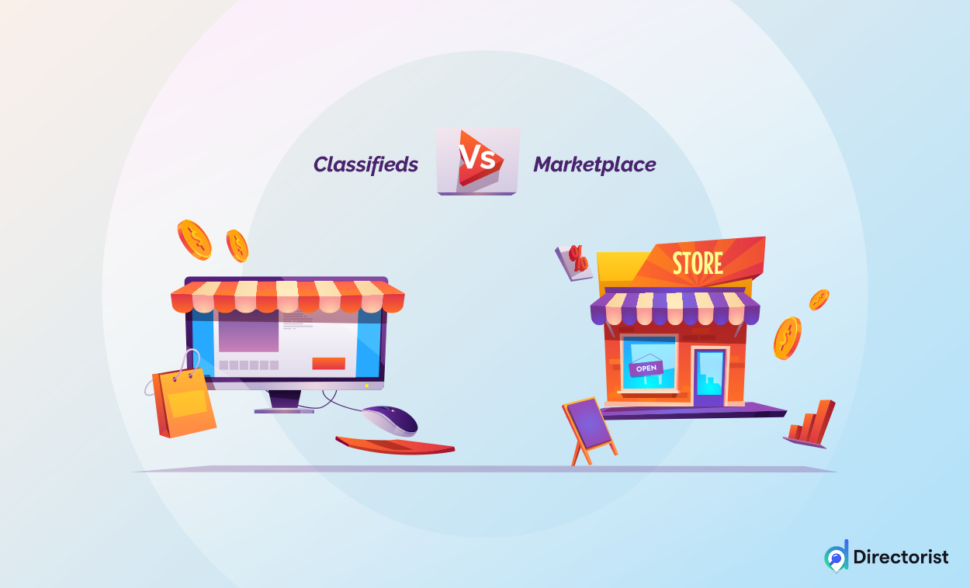Contents
Classifieds vs Marketplaces: What’s The Difference?
Classifieds and marketplaces are two pillars of online commerce, each with its own distinct features. Classifieds, born from the print era but transformed for the digital age, offer a streamlined approach to buying and selling. They excel in simplicity and efficiency, catering to specific categories, locations, or niches. Whether you’re in search of a vintage camera or a local service, classifieds provide targeted listings that save you time and effort in your quest.
In contrast, marketplaces present a vast ecosystem of commerce. They encompass a wide range of products and services, providing a bustling platform where buyers and sellers from around the world converge. Moreover, marketplaces offer diversity on an unparalleled scale, accommodating everything from small-scale artisans to multinational corporations. They foster competition, encourage innovation, and create a dynamic atmosphere where endless possibilities await.
While classifieds and marketplaces have their unique qualities, it’s worth noting that the lines between them can blur. Some marketplaces incorporate classified-like features, enabling users to search for specific items within their expansive catalog. Similarly, classified platforms are evolving to incorporate elements of marketplace dynamics, such as negotiation and long-term relationships.
Putting all those things into consideration, this article aims to outline the distinctions between these two trading platforms, enabling you to expand your understanding of them. So, without any delay, let us proceed to delve into the subject matter.
What are Classifieds?

Classifieds are a form of advertising that is typically used to promote or sell goods, services, or job opportunities. These are traditionally found in newspapers, magazines, and other print publications, although they have also transitioned to online platforms.
In reality, classifieds are organized into specific categories such as real estate, automotive, employment, personal services, and more. Each ad typically consists of a short text description along with contact information for the person or business offering the product or service.
Generally, these ads are usually brief and concise, as they aim to provide essential information while being cost-effective for advertisers. They are often charged based on the number of lines or words used in the ad.
In the past, classifieds were primarily found in printed publications, and individuals would contact the publication to place an ad. Nowadays, with the rise of the internet, online classified platforms have become more popular. Websites and apps dedicated to classified ads allow users to create and publish ads easily, reach a larger audience, and often offer additional features like including images or videos in the ads.
What are Marketplaces?

Marketplaces are online platforms where buyers and sellers can interact and engage in commercial transactions. They provide a virtual space for individuals or businesses to sell products or services to a large customer base. In a marketplace, sellers list their offerings, set prices, and provide descriptions, while buyers browse through the available options, compare prices, and make purchases.
Again, marketplaces can be specialized, focusing on specific niches or industries, or they can be general, catering to a wide range of products and services. They bring together multiple sellers, creating a centralized location for consumers to discover and access various offerings.
Well-known examples of marketplaces include Amazon, eBay, Alibaba, Etsy, Airbnb, Uber, and Upwork. They have transformed various industries by providing efficient and convenient ways for buyers and sellers to connect, expanding choices for consumers, and enabling entrepreneurs and small businesses to reach a broader market.
Classifieds vs Marketplaces: Differences

Classifieds and marketplaces are two different types of platforms used for buying and selling goods or services. While both serve a similar purpose, there are several key differences between them. Here are some of the main distinctions.
Structure and organization
- Classifieds: Classifieds typically have a more structured format where ads are categorized and organized based on specific criteria, such as product type, location, or industry. Users typically create individual listings with detailed descriptions and contact information. Users often search for specific listings or browse through categories to find what they are looking for.
- Marketplaces: Marketplaces tend to have a less rigid structure and allow for a wider range of products and services. They often provide a platform for multiple sellers to list their items or services in a more open format. Marketplaces usually have search functionalities, filters, and sorting options to help users find what they need.
Seller and buyer interaction
- Classifieds: In classifieds, the interaction between the buyer and the seller usually occurs directly between the parties involved. Sellers typically provide contact information, such as phone numbers or email addresses, allowing interested buyers to get in touch to negotiate the terms and finalize the transaction.
- Marketplaces: Marketplaces often facilitate the entire transaction process, including communication, payment, and sometimes even shipping. They provide messaging systems or chat features that allow buyers and sellers to interact within the platform. Some marketplaces may also offer secure payment options or escrow services to protect both parties.
Transaction processing
- Classifieds: Classifieds websites typically do not handle payment processing or transactions themselves. The responsibility for payment, delivery, and other aspects of the transaction rests with the buyer and seller. They are often responsible for negotiating the terms, arranging payment, and organizing the logistics of the exchange.
- Marketplaces: Marketplaces, on the other hand, often offer integrated payment systems. They may provide secure payment gateways, escrow services, or other mechanisms to facilitate transactions. This streamlines the process and adds a layer of security and trust for both buyers and sellers.
Scope and scale
- Classifieds: These are often more localized or specific to certain industries. They may cater to specific regions, cities, or niche markets. They tend to be simpler in terms of features and focus on connecting local buyers and sellers.
- Marketplaces: They have a broader scope and can cover larger geographic areas or cater to various industries. They often have a larger user base and offer a wider range of products or services. Marketplaces can attract buyers and sellers from different locations, facilitating national or even international transactions.
User verification
- Classifieds: Classifieds often rely on users to provide their own contact information and verify their identities. Users are responsible for establishing trust and verifying the legitimacy of the other party involved in the transaction.
- Marketplaces: Marketplaces may have more robust user verification processes. They may require sellers to provide additional information, such as business registration or identification documents, to ensure the authenticity of their listings. Marketplaces may also implement user ratings and reviews, which help establish trust and credibility among buyers and sellers.
Pricing structure
- Classifieds: Classifieds websites may offer free or low-cost listing options, allowing users to create ads without significant financial commitment. They may generate revenue through premium features or additional services.
- Marketplaces: These platforms often charge fees or commissions on transactions conducted through their platform. They provide a broader range of features and services, such as payment processing, dispute resolution, and customer support, which justify the fees charged.
Product variety
- Classifieds: Classifieds platforms typically focus on specific categories or industries. They may specialize in real estate, job listings, vehicles, or other specific areas. Users looking for a particular type of product or service can find dedicated classifieds platforms tailored to their needs.
- Marketplaces: Marketplaces offer a wider variety of products and services, ranging from consumer goods to professional services. They accommodate multiple categories, allowing users to browse and search for various items within a single platform. Marketplaces often provide a more comprehensive shopping experience.
Social interaction
- Classifieds: These platforms generally prioritize one-on-one communication between buyers and sellers. The focus is primarily on exchanging information related to the transaction.
- Marketplaces: They often foster a sense of community and social interaction among users. They may provide features like forums, user profiles, and social sharing options, enabling users to engage with each other beyond individual transactions.
Advertising and promotions
- Classifieds: Classifieds platforms may offer advertising options to boost the visibility of listings or promote specific products or services. These advertisements typically appear alongside regular listings or in designated sections of the platform.
- Marketplaces: Marketplaces often provide built-in advertising and promotion opportunities for sellers. They may offer sponsored product placements, featured listings, or targeted advertising options to enhance visibility and increase sales.
To Bring Things to a Close
In conclusion, understanding the difference between classifieds and marketplaces is essential for anyone seeking to buy or sell goods or services online. Classified platforms traditionally provide a straightforward and localized approach, allowing users to post ads in specific categories and reach a targeted audience within their vicinity. On the other hand, marketplaces offer a broader scope, connecting buyers and sellers on a larger scale and often incorporating additional features such as secure payment systems and customer reviews.
While classified platforms may be suitable for quick, local transactions, marketplaces provide a more comprehensive and dynamic environment. They foster trust and transparency through user feedback and ratings, enabling buyers to make informed decisions, and sellers to build their reputation. Marketplaces also tend to offer a wider range of goods and services, often including specialized categories and niche markets.
Both classifieds and marketplaces have their merits and serve different purposes depending on the user’s needs. Classifieds excel in simplicity and convenience for localized transactions, while marketplaces offer a more extensive reach, enhanced trust, and additional features.
Ultimately, the choice between classifieds and marketplaces depends on factors such as the nature of the transaction, desired audience reach, and the level of security and convenience required. By understanding these differences, individuals can make informed decisions and navigate the online buying and selling landscape more effectively.



Leave a Reply
You must be logged in to post a comment.